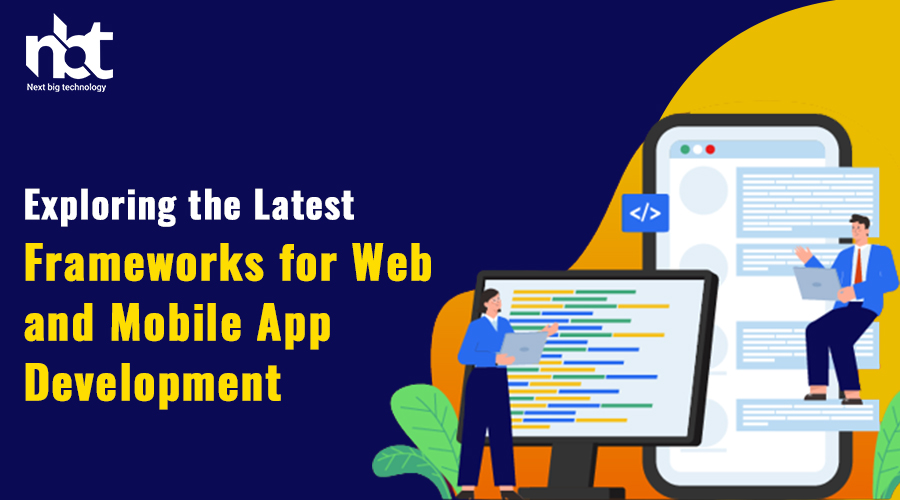Table of Contents
1. Introduction
In today’s digital age, where web and mobile applications have become an integral part of our daily lives, developers are constantly seeking innovative ways to create user-friendly and feature-rich apps. Development frameworks provide a structured foundation for building applications, saving time and effort while ensuring top-notch performance and user experience.
2. What Are Development Frameworks?
Development frameworks are pre-built libraries, tools, and guidelines that aid developers in building software applications. They provide a structured and organized approach to coding, allowing developers to focus on application logic rather than low-level details. Now, let’s explore some of the latest frameworks for web and mobile app development.
3. Web Development Frameworks

Frontend Frameworks
React.js
React.js, developed by Facebook, is a popular JavaScript library for building user interfaces. Its component-based architecture makes it easier to develop interactive and dynamic web applications. React.js has a vast community and offers excellent performance, making it an ideal choice for building modern web applications.
Angular
Angular, maintained by Google, is a comprehensive frontend framework that provides tools for building complex web applications. It offers features like two-way data binding, dependency injection, and a powerful CLI for streamlining development.
Vue.js
Vue.js is a progressive JavaScript framework that is gaining popularity for its simplicity and ease of integration with other projects. It allows developers to incrementally adopt its features, making it a versatile choice for both small and large-scale web applications.
Backend Frameworks
Django
Django is a high-level Python framework known for its simplicity and robustness. It follows the “batteries-included” philosophy, providing various built-in features like authentication, ORM, and admin panels, making web development a breeze.
Ruby on Rails
Ruby on Rails, often called Rails, is a Ruby-based web framework that promotes the use of convention over configuration. It emphasizes productivity and developer-friendly coding practices, making it a favorite among startups.
Express.js
Express.js is a minimalist Node.js framework designed for building web applications and APIs. It is known for its flexibility and is often used in conjunction with other technologies like MongoDB and Angular.
4. Mobile App Development Frameworks

React Native
React Native allows developers to build mobile apps using React and JavaScript. It enables the creation of native-like apps for both iOS and Android platforms, reducing development time and costs.
Flutter
Flutter, developed by Google, is an open-source UI framework for creating natively compiled applications for mobile, web, and desktop from a single codebase. Its widgets and hot-reload feature make it a powerful choice for cross-platform development.
Xamarin
Xamarin is a Microsoft-owned framework for building cross-platform mobile apps using C#. It provides a single codebase that can be deployed on iOS and Android devices, offering a native user experience.
5. Cross-Platform Development
Cross-platform development frameworks like React Native, Flutter, and Xamarin have gained popularity for their ability to write code once and run it on multiple platforms. This approach saves development time and resources, making it a cost-effective solution.
6. Benefits of Using Frameworks
Using development frameworks offers several benefits, including:

- Faster development
- Code reusability
- Consistency
- Enhanced security
- Scalability
7. Choosing the Right Framework
Selecting the right framework depends on various factors, including project requirements, developer expertise, and scalability needs. It’s essential to evaluate each framework’s strengths and weaknesses to make an informed decision.
8. Case Studies
To illustrate the practical application of these frameworks, let’s explore a few case studies of successful web and mobile applications built using the discussed frameworks.
9. The Future of App Development

As technology continues to evolve, the landscape of app development will also change. New frameworks and tools will emerge, offering even more innovative solutions for developers. Staying updated with the latest trends is crucial for staying competitive in the app development industry.
10. Conclusion
In the ever-evolving world of web and mobile app development, choosing the right framework is paramount to success. Whether you opt for React.js for your web frontend or Flutter for cross-platform mobile app development, each framework has its unique strengths. Keep in mind that the key to a successful project lies not only in the choice of the framework but also in the skills and expertise of your development team.
Thanks for reading our post “Exploring the Latest Frameworks for Web and Mobile App Development”. Please connect with us to know more about Exploring the Latest Frameworks.










